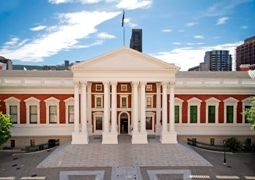
The unrest that broke out in parts of KwaZulu-Natal and Gauteng in July this year following the incarceration of former President Jacob Zuma resulted in damage to property worth billions of rand and left over 350 people dead. It was undoubtedly one of the costliest to human life and the country’s economy since 1994.
This observation was made by the Chief Whip of the National Council of Provinces (NCOP), Mr Seiso Mohai, during a recent ministerial briefing session on the economic and fiscal impact of the July 2021 public violence, looting and destruction of property. “There is no doubt that the July unrest, the destruction and looting of property that claimed over 350 lives, was one of the costliest to human life, the economy and livelihoods of our people post the 1994 democratic dispensation,” he said.
Mr Mohai added that the violence was also a reminder to policy makers in both the private and public sectors of the dangers of poverty, unemployment and hunger, which continue to define the lives of the majority of the people. “However, while we all agree about the glaring poverty, hunger and unemployment that are still concentrated among blacks and Africans, we must avoid the temptations of fanning, direct or indirect, the use of violence to express their anger,” said the NCOP Chief Whip.
Delivering the closing remarks in the one-day hybrid session, Mr Mohai also told the NCOP delegates, deputy ministers, provincial MECs from the economic cluster and other stakeholders that the July unrests were also “a supreme test of our democracy and most importantly the capability of our security apparatus to defend our people in the midst of violent undemocratic channels of protest. We call on the National Prosecution Authority (NPA) to leave no stone unturned in bringing the perpetrators of the mayhem to book,” he added.
The NCOP as a platform for the consideration of national issues that affect provinces invited government ministers and MECs in the economic cluster to discuss the extent of the damages caused by the unrest as well as progress in recovering.
The July violence coincided with 18 months of life during the Covid-19 pandemic, with its own associated socio-economic devastations unparalleled in human history.
Gauteng and KwaZulu-Natal were the provinces most affected by the riots, with other provinces feeling the impact through shortage of food supplies, fuel, pharmaceuticals and other goods due to the disruption of the logistics networks.
The NCOP Chief Whip commended the speedy intervention of government in collaboration with the private sector and social partners to mitigate against the economic and fiscal impact of this violence, saying this will go down in the annals of history as a building block of a resilient nation to work to secure a better future for all.
He also believes that the July mayhem “should be understood within the broader context of the increasing rise of populism in global politics and its associated undemocratic forms of expression against the persistence of poverty, unemployment and inequality.”
Mr Mohai said the briefing produced an emerging collective consensus among provinces and political parties around several issues, such as the support of government mitigation measures to revive destroyed business, the need to strengthen relationship between private and public security sectors to enhance future collaboration in crime intelligence gathering and combating, as well as restoring investor trust and confidence in South Africa as an investment destination.
“The swift response by government and the South African Special Risk Insurance Association to recapitalise destroyed business will go a long way in assuring the international and local investors about South Africa’s capacity as an investment destination,” he said.
The MEC for Economic Development, Tourism and Environmental Affairs in KwaZulu-Natal Mr Ravi Pillay told the NCOP session that over 4 000 businesses in that province were damaged during the unrest. “The unrest worsened the impact of the Covid pandemic, as well as years of recession and poverty that provided a fertile ground for the protests, which were triggered by the incarceration of the former President,” said the MEC.
MEC Pillay said the closure of the N3 road, which connects KwaZulu-Natal to other provinces created uncertainty in fuel supply and food security, as well as investor confidence.
His Gauteng counterpart Mr Parks Tau said his province has implemented measures to mitigate the impact of the July unrest, such as the establishment of economic and social infrastructure programmes aimed at resuscitating the provincial economy.
Economic development MECs from Free State, Northern Cape, North West and Western Cape also made presentations.
Sakhile Mokoena
24 November 2021

